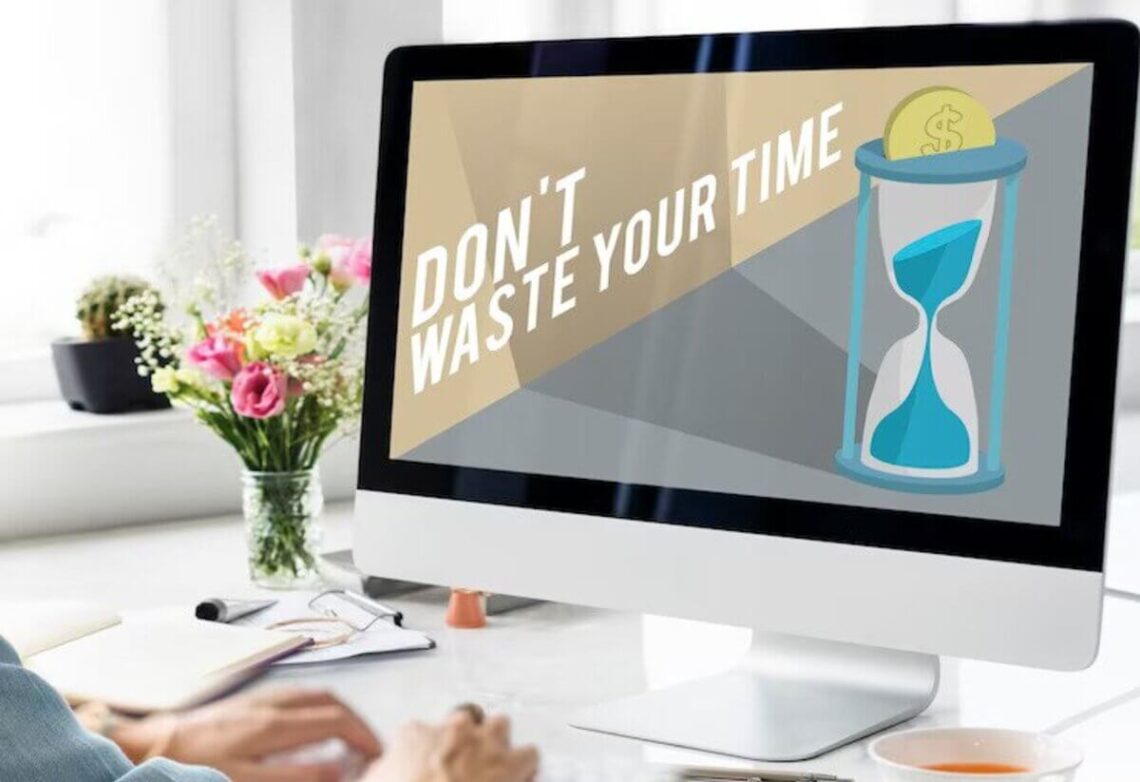
How to Beat Procrastination
The most common question is, how do you beat procrastination? And the answer is, in this book, the War of Art, by Steven Pressfield, he says that most of us have two lives, the life we live and the unlived life within us and between the two is this thing called the resistance. And that is the secret to overcoming procrastination.
And this is actually a surprisingly life-changing insight. It actually completely changed the way that we approach life and meaningful productivity, and it kind of helped us stop being a chronic procrastinator. And so in this article we’re going to talk about three key points from the book that have helped everyone beat procrastination, and hopefully they can help do the same for you.
Know Thy Enemy

So the first question we need to address is what is resistance? Resistance is the negative force that’s actively working against us to stop us from doing the things we want to do. It doesn’t stop us from watching Netflix or from playing video games. Instead, it stops us from doing anything that we know in our hearts is going to level up our lives.
Like resistance isn’t really that feeling that we get when we can’t be bothered to clean the desk or can’t be bothered to wash the dishes. Now that is resistance with a small R. But resistance with a big R is the force that’s holding us back from doing creative or entrepreneurial things or things that require any level of risk taking or putting ourselves out there.
And whenever we try to do any of this stuff, we always have to go up against this hill of procrastination. That’s a constant battle. And there’s a nice quote from the book where he says, “We don’t tell ourselves I’m never going to write my book. Instead, we say, I am going to write my book. I’m just going to start tomorrow”.
I’ve heard this a million times of people being like, you know what? I want to start a YouTube channel. At some point, I’m going to start a podcast. But you know, the timing isn’t quite right. Oh, you know, I haven’t quite got the gear. I haven’t quite got the kudos. Why would anyone care what I have to say? This is all resistance. It’s all that procrastination that’s building within us.
But what really fuels resistance is fear. Resistance is activated by fear and gains strength. Whenever we give into that fear, creating a cycle that we fall into, and which leads to resistance becoming even stronger as our fear becomes even greater.
But as he says in the book, fear is actually a very good thing because when we feel scared about doing something, it usually means we should just do the thing. He writes, remember one rule of thumb, the more scared we are of a work or calling the more sure we can be that we have to do it. And in a way, resistance is that compass that points towards a thing in a life that’s actually most important for us to do.
Like we never feel any resistance towards sitting down and playing World of Warcraft, but I do feel resistance towards sitting down and writing my book. And that tells me that sitting down to write my book is currently the most important thing I need to be working on. And the key rule of thumb here, as Steven Pressfield writes is, the more resistance you experience, the more important your un-manifested art or project or enterprise is to you.
And since we first found this in 2017, we’ve actually started using this as a model decision making. Like if we feel scared about doing something, then more often than not, we will try our very best to actually do the thing. And so far in our life, we have never regretted doing something that we were scared of. But we’ve always regretted not doing something that we were scared of.
Become a Professional

So now that we’ve done step one, which is to know our enemy, and we’ve defined resistance and figured out what it actually is, it’s that source that makes us procrastinate. We need to figure out some ways of dealing with it. And the first one is key point number two in this article, which is to become a professional.
In the book, Pressfield introduces the idea of the professional versus the amateur. An amateur takes action whenever inspiration strikes or when they’re in the right mood. They’re not committed, and the goals are focused on fun, money and status. A professional shapes their life so that work is a priority. They’re determined and committed to succeed by following their inner drive and creative spirit. Now, our boy, Steve says that the only way we can deal with resistance is if we become a professional with our work rather than an amateur. And it’s interesting how he doesn’t define professional as being someone who makes money from the thing, because you can want to make money from a thing, but still treat it like a complete amateur.
But instead a professional is someone who does it for the sake of doing the work and takes pride in the work itself. And there’s a few other traits that professionals have when it comes to doing their job. If you’re a professional, then you’ll show up every day to your job no matter what. You wouldn’t just not go to work because you don’t feel like it.
If you’re a professional, you work through adversity and you are open to criticism because you always want to improve. Whereas if you’re an amateur, then your feelings will be hurt and If you draw something or make a video and someone gives you bad feedback or you get a bad comment, you get really upset and it ruins your life because you’re treating it like an amateur.
Whereas if you treat it as a professional, you would be more inclined to actually grow from the feedback. A professional as well will understand that fear is just part of the work. If you’re a doctor and that’s your profession, you know that you’re going to be stepping outside your comfort zone.
Whereas if you approach things with an amateur perspective, like starting a YouTube channel, as soon as the going gets tough, you will fold like a cheap suit, as they say. And finally, if you’re a professional with your work, you recognize that facing resistance is the daily battle.
There is certainly something to be said for not monetizing all of your hobbies, or at least not trying to make a living from your hobbies. Because, a hobby is fun when it makes a bit of money, like playing the guitar. If someone could get paid a bit of money to play the guitar, that would make it really, really fun. But if that person was reliant on playing the guitar for earning a living, they’d be starving on the street. And it would also make playing the guitar a lot less fun.
So treating our creative and entrepreneurial stuff as a professional doesn’t mean it takes over our life. It just means that we’re approaching it with a bit more of a professional mind-set rather than the mind-set of, oh, I’ll do my thing whenever I feel like it. Because that doesn’t really work if you’re treating something like a pro.
Banish the Ego

Now he said that once we’ve become a professional, the next thing we need to do is recognize the ongoing battle between the self and the ego.
And the way I see this is that our ego is more focused on external events and how other people see us, whereas the self is this inner calm that we have. Which is about the way that we see ourselves. When we’re led by our ego, our main priorities are to maintain the status of the ‘I’ in the world, and we’re just focused on how external events affect us and everything is very superficial and surface level.
Then we’ve got the self, which is made up of the individual and collective unconscious areas of our minds. Which includes our dreams, intuition, visions and aspirations. It encompasses the deepest form of who we are. And when we sit down to create, we’re attempting to channel the self because it’s through the self that we can beat resistance.
Now, some of this stuff is a little bit technical. Pressfield goes on about how creative endeavors are and about a new plane of existence and we’re all striving for that plane of existence and resistance is like the devil that gets in the way.
It’s kind of similar to the growth mind-set and fixed mind-set in a way. When we have a fixed mind-set and we get negative feedback or something, or we do something that we know is not very good, it really shakes us to the core because it damages our ego. Whereas when we have a growth mind-set to something, we recognize that if we fail at something, it’s just part of the process of improving over time.
And another way that I think of this is when it comes to goal setting. So I found that for me, I get a lot more resistance i.e., procrastination when I’ve got goals that are based on outcomes that are outside of my control. So, for example, if I’m making YouTube videos, I want this video to get this many views, or I want to hit many subscribers by the end of the year. That’s very outside of my control. The only thing in my control is making the videos, but if I have a goal that I want this video to be really good, then that’s when perfectionism takes hold. That’s when I feel the resistance. That’s when I procrastinate so much to the point that I don’t even make the video.
What I prefer is to have most of my goals being input goals i.e., they are entirely within my control and they’re entirely based on inputs that I control. So I’m going to make two videos a week. For the, for the rest of my life, is an input goal. It’s something that’s broadly within my control.
I’m going to write the best book that I can or, and a book that I’m happy with is an input goal. It’s a goal within my control, whereas I’m going to write a book and I wanted to hit the New York Times bestseller list. That’s very much an output goal and is broadly outside of my control.
And I find that when it comes again to writing my book, anytime I even think of that outcome goal, I feel the procrastination. I feel the resistance. I feel the pain. Whereas when I think, what my job is, to just write the best book that I can, it becomes a lot easier to do. And now I’ve realized that for basically whatever I do, if I’m struggling with procrastination, usually it’s the resistance getting in the way. And usually it’s because I have some kind of outcome goal associated with the thing, which for me personally, is bad. It works for some people, but I don’t personally like them.
In The End
Now we’ve talked about three ways of beating procrastination. Number one, name the enemy I either resistance number two, become a professional. And number three, banish the ego.
We can change our lives. There never was a moment and never will be when we are without the power to alter our destiny. This second, we can turn the tables on resistance. Practice these things in life positively to see the difference.

